Advertisements
Advertisements
प्रश्न
The last two lines of the poem are not prohibitions or instructions. What is the adult now asking the child to do? Do you think the poet is suggesting that this is unreasonable? Why?
उत्तर
The adult is now asking the child to think independently. The poet finds this entirely unreasonable because the young child has not been trained to use his mind. He has only been trained to follow the instructions given by the adults.
APPEARS IN
संबंधित प्रश्न
Who had these opinion about Einstein?
He was stupid and would never succeed in life.
Match the phrases in Column A with their meanings in Column B.
| A | B | ||
| (i) | broke out | (a) | an attitude of kindness, a readiness to give freely |
| (ii) |
in accordance with |
(b) | was not able to tolerate |
| (iii) | a helping hand | (c) | began suddenly in a violent way |
| (iv) | could not stomach | (d) | assistance |
| (v) | generosity of spirit | (e) | persons with power to make decisions |
| (vi) | figures of authority | (f) | according to a particular rule, principle, or system |
What is the significance of the title?
Read the following extracts from the story, and try to puzzle out the meanings of the encircled words from other words and phrases in the extract. Write the clues in the empty boxes. Then give your own explanation of the encircled word.
When the liner had finally vanished over the horizon, I was absolutely alone in the stormy night sea. First I thought I had to swim one way, then another. It was not even midnight yet, and I had no hope at all of finding my way in this terrible night time ocean. I began to feel afraid. Waves of fear rolled through me, starting from my hands and feet, attacking my heart and then reaching through my neck to my head. Waves broke over me and water went into my snorkel. I realised I would not be able to last even half an hour in such a condition.
I saw individual stars, but I could not distinguish the constellations they belonged to. Then dawn came and put out all my stars and I felt my solitude more keenly. The sky was grey at first, then blue-violet shades appeared. In a few minutes, the colours became brighter, with dark red strips cutting across the sky!
The rising sun came up over the ocean. I was surrounded by large waves. The clouds turned pink and swept across the sky in all directions. It was a windy day.
There was no land visible. I grew alarmed. Had I made a mistake in my calculations? Perhaps the current had carried me a long a way off the course during the night?
An hour passed, perhaps two. "Landlll" I could not deny myself the pleasure of shouting the magic word aloud and of hearing my own voice. Perhaps it was my ghostly island of Siargao? I almost felt I had succeeded - now at least I had hope.
The sun looked out for the last time, as if it was saying goodbye to me, and hid itself away again. In a few minutes the sky was filled with all the colours of a rainbow, the bright shades changing and merging as I watched. At first the clouds became deep red and then their edges turned bright orange. A little while afterwards, the clouds turned lilac and dark violet. Darkness fell swiftly. My second lonely night in the ocean began. The stars came out unnoticed. I changed course and headed for the south west. As it turned out, this was an unforgivable mistake.
Evening was approaching. The ocean around me was full of life; large fish often leapt out of the water and big birds flew right above my head. I could see the island distinctly now. A line of dancing palms stretched the length of its shore. The sides of the mountain were covered in many different shades of green.
An hour passed, perhaps more. It was extraordinarily quiet. Then suddenly to my horror, I discovered my island had noticeably begun to move north and was drifting further and further in that direction right before my eyes. Before I had worked out what was happening and could sharply change my course towards the north, the southern tip of the island had appeared in front of me and, beyond that, open ocean stretched to the very horizon. I was totally at the mercy of the current and realised to my alarm that it was slowly carrying me past the land.
My third night in the ocean crept up unnoticed. This third night in the ocean was very dark, much darker than the two previous ones. I almost decided to die as I had no hope of seeing another dawn. I was suddenly aware of a quiet voice: "Swim to the sound of the breakers."
Indeed, there had been a distant rumbling for some time, although I had paid no attention to it. Now, I started listening and I thought it sounded like the characteristic noise of jet aeroplanes constantly landing and taking off. The voice inside kept insisting that I should swim towards this thunder of waves.
At last I obeyed. Again I heard an approaching rumble. What I suddenly saw at a distance of about 30 or 40 metres has imprinted itself on my memory forever. It was a gigantic wave with steep, very slowly falling crests. Never in my life had I seen such an enormous wave - it even seemed to be touching the sky. It moved very slowly and was fantastically beautiful.
The wave did not break over me as I assumed it would. An irresistible force dragged me up its steep slope right to the very foot of the falling crest. Instinctively I clutched my mask snorkel and managed to take a deep breath. The crest started to break over me and pulled me under it. For a moment, I found myself in the air
under the crest as ifin a cave. Then my body was in a swirling current of water; the inner power of the wave made me recover several times, twisting me in all directions before it subsided.
I realised that I had to try to keep my body on the crest and I quickly took up a horizontal position. This time the wave quickly grabbed me and carried me at great speed for quite a long distance on its crest.
I got up to the surface easily and swam in the direction the waves were heading. "Somewhere there, beyond the reef, there should be a lagoon," I hoped.
Suddenly, I felt something hard under my feet. I could stand up to my chest in water! Around me I could see random currents of water, splashes of foam and phosphorescent spray, all swirling about. Before I fully came to my senses, another large wave approached and carried me some distance further. I was up to my waist in water when a new wave picked me up, taldng me several metres forward. Now the depth of the water was only up to my knees. I had enough time to take a few tentative steps, to catch my breath and look around.
I surfaced at the foot of very tall palm trees. I left a trail of luminous water and my body glittered like some princess's ball-gown. Only now did I feel completely safe. The ocean was behind me ....
(a) I saw individual stars, but I could not distinguish the constellation they belonged to. Then dawn came and put out all my stars.
Therefore, constellation means ................... 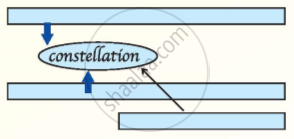
(b) Indeed there had been a distant rumbling for some time, although I had paid no attention to it. Now that I started listening to it I thought it sounded like the characteristic noise of jet airplanes constantly landing and taking off.
Therefore, rumbling means ............
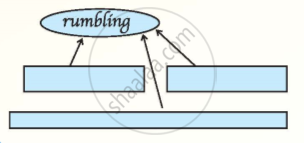
(c) It was a gigantic wave with steep, very slowly falling crests. Never in my life had I seen such an enormous wave. It seemed to be touching the sky.
Therefore, gigantic means ............
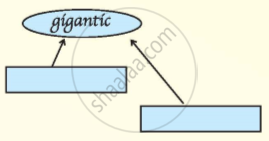
(d) The wave did not break over me as I assumed it would. An irrsistible force dragged me up its steep slope, right to the very foot of the falling crest.
Therefore , irrisistible means.....................

(e) For a moment, I found myself caught in the air under the crest, as if in a cave . Then , my body was in the swirling current of water ; the inner power of the wave made me recover several times , twisting me in all directions before it subsided .
Therefore , swirling means..........
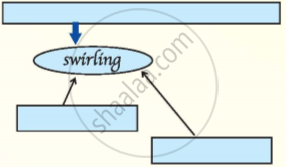
(f) All around me I could see random currents of water splashes of foam and phosphorescent spray of luminous water and my body glittered like some princess's ball gown.
Therefore, phosphorescent means .................
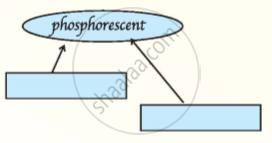
Read these sentences from the story.
1. We will go to the old man.
2. Iwillopenmyhands.
3. It will flyaway.
4. I will crush the butterfly.
The modal will is used to talk about a temporary event in progress at some
point in future.
Will is used to denote _________ time.
Did you know?
There are different constructions in English which can be used to refer to
future time.
1. Use of the simple present tense.
a. The IPL begins on 20th April.
b. If the newly introduced vaccine works, AIDS can be cured.
2. Use of shall/will
Will/shall is used to make a prediction about future events, in
advertisements, posters etc.
e.g. a. You will win the 1st prize.
b. The Nano car will be on the roads soon.
c. You shall lead a happy life.
3. Use of going to
Going to is normally used to refer to future events in two cases
(a) If there is a present indication of the future event.
e.g. India is going to emerge as a Super Power in 2020.
(b) to express intention
e.g. Smitha is going to marry Akshay.
4. Use of present continuous tense (be+ verb+ ing)
Present continuous tense is used to refer to future events that have been
already planned.
e.g. a. I'm meeting the Project Manger this evening.
b. I'm sorry I can't meet you tomorrow. I'm visiting my friend.
5. Use of be + about to + infinitive.
e.g. The train is about to leave.
6. Useofbe+to+v
e.g. Obama is to visit India in October.
The angel wrote and vanished.
The next night, It came again with a great wakening light,
And show's the names whom love of God had blest,
And Lo! Bin Adhem's name led all the rest.
Read the lines given above and answer the following question.
Mention two other words used by the poet to refer to the angel.
“You haven’t brought home that sick brat!” Anger and astonishment were in the tones of Mrs. Joe Thompson; her face was in a flame.
“I think women’s hearts are sometimes very hard,” said Joe. Usually Joe Thompson got out of his wife’s way, or kept rigidly silent and non-combative when she fired up on any subject; it was with some surprise, therefore, that she now encountered a firmly-set countenance and a resolute pair of eyes.
“Women’s hearts are not half so hard as men’s!”
Joe saw, by a quick intuition, that his resolute bearing h«d impressed his wife and he answered quickly, and with real indignation, “Be that as it may, every woman at the funeral turned her eyes steadily from the sick child’s face, and when the cart went off with her dead mother, hurried away, and left her alone in that old hut, with the sun not an hour in the sky.”
“Where were John and Kate?” asked Mrs. Thompson.
“Farmer Jones tossed John into his wagon, and drove off. Katie went home with Mrs. Ellis; but nobody wanted the poor sick one. ‘Send her to the poorhouse,’ was the cry.”
“Why didn’t you let her go, then. What did you bring her here for?”
“She can’t walk to the poorhouse,” said Joe; “somebody’s arms must carry her, and mine are strong enough for that task.”
Read the extract given below and answer the question that follow.
Does the attitude of the villagers convey some truth about society at large?
She lighted another match, and then she found herself sitting under a beautiful Christmas-tree. It was larger and more beautifully decorated than the one which she had seen through the glass door at the rich merchant’s. Thousands of tapers were burning upon the green branches, and colored pictures, like those she had seen in the show- windows, looked down upon it all. The little one stretched out her hand towards them, and the match went out.
The Christmas lights rose higher and higher, till they looked to her like the stars in the sky. Then she saw a star fall, leaving behind it a bright streak of fire. “Someone is dying,” thought the little girl, for her old grandmother, the only one who had ever loved her, and who was now dead, had told her that when a star falls, a soul was going up to God.
Read the extract given below and answer the question that follow.
What happened when she stretched her hand to touch?
Answer the following questions.
The old farmer is a kind person. What evidence of his kindness do you find in the first two paragraphs
The wicked farmer wanted to be rich like his neighbour. What happened every time when he tried to do so?
Whose knucklebones were collected by Willy Wonka?
Name five ancient things collected by Mr Wonka.
How did the author said to encourage his friend to fix the gear-case?
How did Ray tackle the evil-minded shoppers?
What does the poet refer to ‘meadow houses’?
Word in the box given below indicates a large number of… For example, ‘a herd of cows’ refers to many cows. Complete the following phrase with a suitable word from the box.
a _________________ of flowers
Answer the following question:
Why did the villagers want to drown Taro?
What information about snakes do you get in the lesson Desert Animals?
Read the lines given below and answer the following question:
| Iris: Of her society Be not afraid. I met her deity Cutting the clouds towards Paphos, and her son Dove-drawn with her. |
Why was the person addressed afraid of “her”?
What does Banquo’s soliloquy in Act III Scene i of the play Macbeth, reveal about him?
